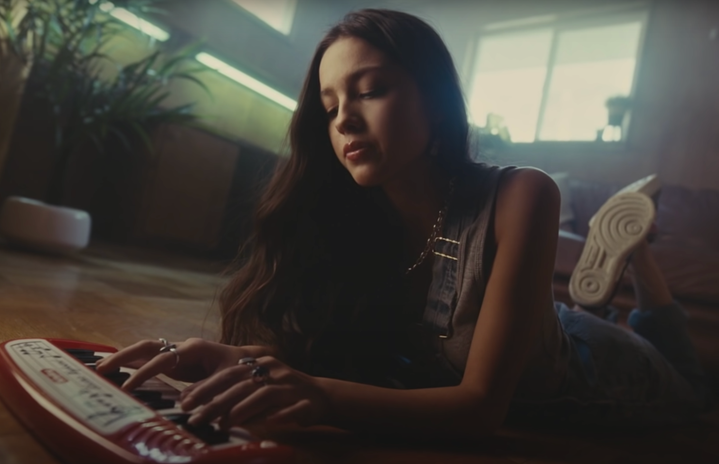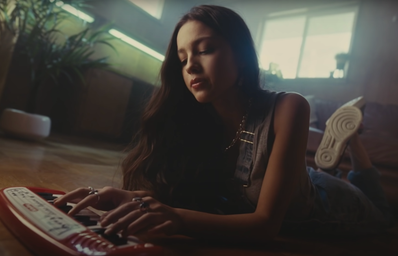On September 8th, Olivia Rodrigo of “driver’s license” fame released her sophomore studio album titled Guts. If Sour was about teenage angst, Guts is its deeper, somehow angstier older sister who is stuck between the limbo of what she wants vs what society wants. Despite their shared purple theme, Guts’ deep violet pulls listeners into a more nuanced look at teenage life in all its idiosyncrasies. It’s clear that Rodrigo’s discography is going to become the soundtrack to many girls’ most pivotal life moments; it already has for mine. This album is well summarized by a meme Rodrigo posted to her Instagram the day of its release: a pyramid of the different degrees of education, from high school diploma at the bottom, to a Ph.D. almost at the top. What teaches you the most? Being a girl living through the age of 19.
The album begins with plucking guitar notes that collide into a clash of pop punk perfection. Rodrigo takes her brand as the newest pop IT Girl and flips it around. Instead of trying to be this perfect role model with “class and integrity just like a goddamn Kennedy,” she expresses how she doesn’t always feel that perfect all the time, sarcastically screaming “to deal with it.” I love how the song ends with pseudo-affirmations depicting what the perfect “all-american b*tch” would be like. You can almost picture Rodrigo, with her Coca-Cola curled hair, reciting the words “I’m pretty when I cry” into a mirror as mascara runs down her face. Actually, I can picture myself doing that too.
Rodrigo continues similar themes of external pressure in “making the bed”. The name comes from the phrase “you’ve made the bed, now lie in it,” which basically means take responsibility for the consequences of your actions. By releasing songs, Rodrigo believes she has ruined another thing she “used to do for fun.” She’s tired of getting caught up in silly love triangles, “playing the victim so well in [her] head,” and being accused of unoriginality. I love how she feels okay talking about the mental struggles of fame and not having that “perfect” persona she details in the first track.
“All-american b*tch” also echoes issues raised in “pretty isn’t pretty,” the penultimate track. In the Spotify canvas for the song, you can see Rodrigo apply mascara over and over again, mirroring how girls feel the need to physically perform to meet societal expectations. As my chosen “hidden gem” of the album, it perfectly sums up the female experience living in a patriarchal society run by body standards and toxic social media posts. “It’s on the posters…magazines…in my phone…it’s all around,” Rodrigo spits out in an anxiety-inducing second verse.
If you thought Guts couldn’t call you out more, here enters “ballad of a homeschooled girl”. Set to a catchy verse overlaid with electric guitar and drums, it takes even the most public school educated like me and pushes them right back into a high school party where they felt like the cringey outsider. By playing up the (wrong) notion that homeschooled kids are always socially awkward, Rodrigo commits “social suicide” as she googles WikiHow instructions on how to flirt and laments over the fact that “every guy [she] like[s] is gay.” A standout of the album that I have been streaming actually every day, “”ballad of a homeschooled girl” begins a line of punky bildungsroman reminiscent of Avril Lavigne and The Regrettes.
“Love is embarrassing” and “get him back!” complete my little holy grail of angsty Olivia. They both begin with riveting drum lines that you can’t help but bop your head to. “Get him back!” reads as a talking confessional, almost like Olivia’s just spilling tea to you over coffee. You can even hear her smile as she delivers the line “But I am my father’s daughter, so maybe I could fix him.” Absolutely iconic, by the way. This behavior then makes Rodrigo reflect and realize that love is actually really embarrassing. Why is she falling over herself to get back some “loser who’s not worth mentioning?” Both songs perfectly complement the two sides of love one can feel in a single relationship.
However, among the “song[s] with the drums,” piano is where Rodrigo’s voice and lyrical ability truly shines. Take “logical”, the middle ballad of the album. Besides her terrible teaching of “two plus two equals five,” Rodrigo pours her heart out wondering how she could be so stupid. I feel like movies and tv shows always portray this romanticized version of well, romance, and in my experience even platonic relationships are super complicated and can make you feel illogically scared. And when someone feels that vulnerable in a relationship, they are prime for a bloodsucking vampire.
“Vampire“, the first single of Guts, absolutely delivered. From a song-long crescendo to a heart-pumping bridge that brutally calls out the subject, it ticks all the boxes for an Olivia Rodrigo hit in my book. It makes me want to run around a city street yelling the lyrics as emotionally as I possibly can. “Vampire” chronicles an age-gap relationship Rodrigo had (evidenced by the line “Cause girls your age know better”), and how such relationships can make you feel like you’re losing your life force; you are slowly being sucked dry like the victim of a vampire. I can tell the lyrics were just pouring out of Rodrigo, attesting to her incredible song-writing abilities. One essential viewing to get the “vampire” experience is her performance of the song at the 2023 VMAs last Tuesday, which included planned stage malfunctions that really add to the craziness of the whole song.
Like me, you were then thinking: how could Guts’ second single be any better? That question’s answer is “bad idea, right?”, a great introduction to the more fun side of the album. I first heard this song during the dwindling hours of a birthday sleepover, and my friends and I immediately fell in love with its blasé, “f*ck it, it’s fine” attitude. I’m also a sucker for unique sounds in songs, and so the initial record scratch, dragging “ah’s” of the refrain, and full stop after she says “stop” just made me love it more.
I also would be remiss without mentioning “lacy“, the first soft song of the album. Without paying full attention, I originally mistook it as a queer-coded admission of a crush on a girl named Lacy, or at least a deep admiration to be like her. And it sort of is, until Rodrigo spurts out a line about “this side of hell” and slides down a spine-tingling note at the end of the chorus. Then the song devolves into the jealousy Rodrigo feels for Lacy, making you want to know the full situation of their relationship immediately. It truly toes the line between “do I want to be her” or “do I want to be with her.” This one took a bit to grow on me, but in the end I love how uniquely she describes Lacy.
This may just be personal preference, but I found the slower tunes like “the grudge” to be lower points on the album. Wandering through a melancholic piano, “the grudge” tells an all-too-similar tale of terrible pain through a dangerous relationship. While there’s no denying that Rodrigo perfectly pours her heart out as she sings, “it takes strength to forgive but I don’t feel strong,” the song didn’t immediately stand out to me as very unique on the first couple of listens. Same goes with the ending track, “teenage dream.” And no, it’s not a cover of a 2010s Katy Perry song. The initial cut of the lyric, “when am I gonna stop being wise beyond my years and just start being wise,” takes us full circle to the pressure Rodrigo faces as she turns 19. We hear often that it’s the final year of being a teenager and we must be ready to enter our terrifying 20s when Life. Gets. Real. “Will I spend all the rest of my years wishing I could go back?” Rodrigo cries over the soft piano.
She ends the track and the album with a haunting layer of vocals chanting “They all say that it gets better, it gets better.” It leaves a pensive feeling on the listener, making them reflect on their teenage years, their place in this world, and the expectations they feel from their relationships to perform well in society. Rodrigo is able to effortlessly shift from silly situationship quips to deep-seated fears about her life as a whole. Unfortunately for us, these common worries cannot be cured in just a few minutes. All we can do is stream Guts and understand that other people feel like this too. This album has already been on repeat in my headphones for the past week, and I will not be surprised if one of the songs appears in my Spotify Wrapped. And with the Guts: World Tour set to begin in February, this is not the last time you will hear about this all-american b*tch.


